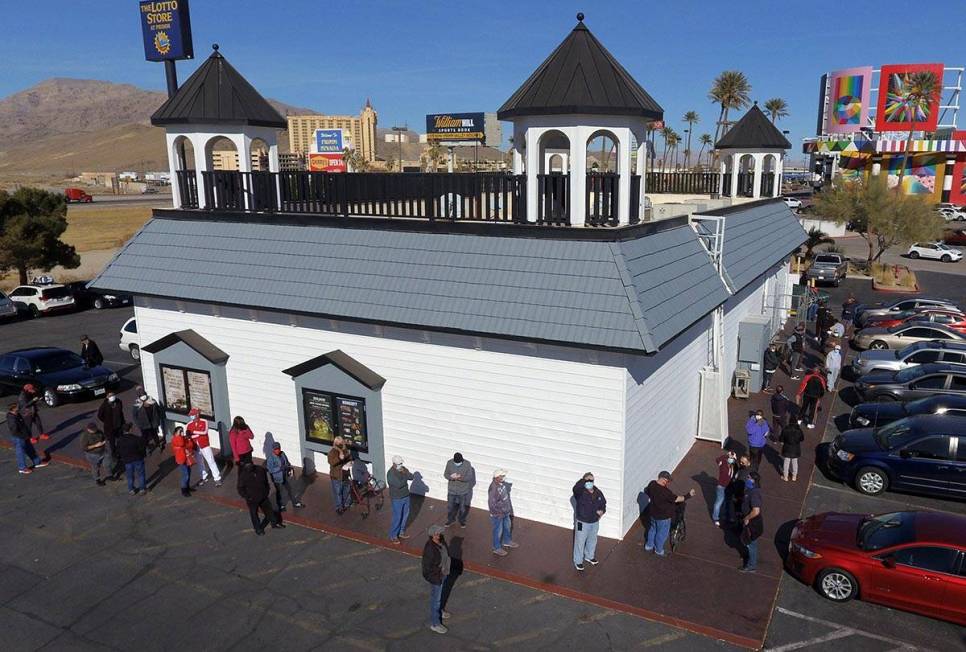Will Nevada have a lottery? Opposing sides weigh in on state lottery proposal

There’s a little nook in the casino for vending machines at Encore Boston Harbor in Everett, Massachusetts.
The machines don’t sell cigarettes, candy bars or soft drinks. Instead, patrons can purchase packets of lottery tickets from the Massachusetts Lottery. The state’s three major casinos are required to provide space to sell tickets.
What a difference from Nevada, where Culinary Local 226 is fighting an uphill battle to get a proposal on the ballot to amend the state’s Constitution to allow for the development of a state lottery.
The process for legalizing a lottery in Nevada follows a lengthy path. The Legislature must first have a resolution approved in a session. If lawmakers are successful, a similar resolution must pass a second time in a future session. Once that occurs, it would be placed on a statewide ballot for final approval by voters.
As of last week, the Culinary union’s proposal hasn’t reached the first step.
The union, which has some pull with the Democratic majority Senate and Assembly, wants the state lottery to fund youth mental health programs and education.
But Assembly Joint Resolution 5, the proposal that would permit lotteries, makes no mention of mental health or education funding. There are no details on what a state lottery would look like or who would oversee it.
Would it be just the sale of scratch tickets? Would numbers be drawn on local television? Would the plan involve video lottery terminals? If a part of multistate drawings, would Nevada get just a proportional share of the proceeds based on the number of in-state ticket sales?
The gaming industry, through the Nevada Resort Association, also is influential with lawmakers and has weighed in against a lottery.
The popular spin over why the gaming industry opposes a lottery is that it would represent a form of government-backed competition against the casino industry. It may be right about that, based on the popularity of Nevadans buying lottery tickets in California and Arizona when jackpots reach supersized levels for multistate games such as Powerball.
Other states’ lotteries popular
Because the California and Arizona borders are about an hour away by car from Las Vegas and less for those in Reno heading to California, it’s easy for Nevada residents to buy tickets when the jackpots soar. For that reason, it seems likely that if a constitutional amendment question ever gets on the ballot, it would pass.
Though lottery ticket purchasers face astronomical odds of winning big money, they still take a chance in a game such as Powerball, where ticket buyers have a 1 in 292,201,338 chance of winning the jackpot.
The Culinary union points out that ticket purchasers are funding California education whenever they buy a ticket.
The California Lottery’s most recent fiscal year report, from 2021, showed that about two-thirds of the $8.4 billion spent on lottery tickets went to prizes for the winners. The other one-third was divided among K-12 education, California State University and University of California educational systems, community colleges, UC Law San Francisco, Department of Education special schools fund, Department of Developmental Services, Juvenile Justice and the vendors who sold the lottery tickets.
The Culinary views a state lottery as a potential source of funding for a chronic state problem.
“Enacting a state lottery is a dependable source of revenue for nearly every state in the country, and in a state where gaming is the cornerstone of the economy, there is no public policy rationale to continue the ban on a state lottery that is present in the Nevada Constitution,” the union said in a position paper. “It is difficult to estimate how much money Nevada is losing when Nevada residents purchase lottery tickets from other states, but the figure is almost certainly more than $10 million a year.”
Would casino revenue go down if a lottery were established in the state?
Nevada Resort Association President Virginia Valentine said that in addition to AJR5 not guaranteeing any lottery funding toward mental health problems, the lottery could hurt state tax collections and services that are funded by the state’s casinos.
“While we agree more needs to be done today to address our youth’s mental health challenges, AJR5 does not mention mental health or guarantee that funding would be put towards mental health programs,” Valentine said.
“In stark contrast with Nevada’s resort industry, lotteries provide almost no employment and create no economic development or capital investment,” she said. “Currently, there are approximately $23 billion in tourism-related capital projects underway or planned in Nevada. Further, lotteries cannot produce the vast array of meaningful careers found in Nevada’s resort industry, everything from engineers, electricians and chefs to jobs in technology, hotel operations, entertainment and much more.”
Culinary, meanwhile, criticized the Nevada Resort Association for advocating against a lottery.
“It is disappointing to hear that Nevada’s biggest industry is content with Nevada being last in the country in mental health and close to last on education,” union officials said. “We urge the Nevada Resort Association to do better for our communities. Why is the NRA opposed to the lottery when 45 out of 50 states have it already? Every state that has legal commercial gaming also has a state lottery — except Nevada.”
Contact Richard N. Velotta at rvelotta@reviewjournal.com or 702-477-3893. Follow @RickVelotta on Twitter.